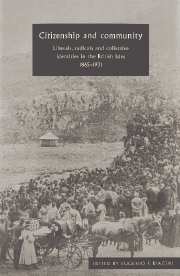 Citizenship and Community
Citizenship and Community Book contents
- Frontmatter
- Contents
- List of contributors
- Acknowledgements
- Introduction: Citizenship, liberty and community
- Part I Citizenship, populism and liberalism
- Part II Economic democracy and the ‘moral economy’ of free trade
- Part III Democracy, organicism and the challenge of nationalism
- 10 Land, religion and community: the Liberal Party in Ulster, 1868–1885
- 11 Nationalising the ideal: Labour and nationalism in Ireland, 1909–1923
- 12 Land, people and nation: historicist voices in the Highland land campaign, c. 1850–1883
- 13 The Welsh radical tradition and the ideal of a democratic popular culture
- Part IV Consciousness and society: the ‘peculiarities of the British’?
- Index
12 - Land, people and nation: historicist voices in the Highland land campaign, c. 1850–1883
Published online by Cambridge University Press: 16 September 2009
- Frontmatter
- Contents
- List of contributors
- Acknowledgements
- Introduction: Citizenship, liberty and community
- Part I Citizenship, populism and liberalism
- Part II Economic democracy and the ‘moral economy’ of free trade
- Part III Democracy, organicism and the challenge of nationalism
- 10 Land, religion and community: the Liberal Party in Ulster, 1868–1885
- 11 Nationalising the ideal: Labour and nationalism in Ireland, 1909–1923
- 12 Land, people and nation: historicist voices in the Highland land campaign, c. 1850–1883
- 13 The Welsh radical tradition and the ideal of a democratic popular culture
- Part IV Consciousness and society: the ‘peculiarities of the British’?
- Index
Summary
Conventional wisdom has tended to presume that the political movement for land reform in the Highlands of Scotland grew organically and unproblematically out of the crofting community itself, and that the victories of the Crofters’ Party in the elections in 1885 and 1886 moved by some ineluctable process from the spontaneous outbursts of anger characteristic of the ‘land war’ of the first half of the 1880s. In the best of such accounts outside influences are never neglected and a subtle and variegated picture of the land reform campaign has been presented. The concern here will be to examine the complex historical construction of the crofting community behind the political movement arguing the crofters’ case. This means focusing upon the relationship between the images of culture, language and community projected by the land reform movement. At the heart of this lay the question of land and the rich and culturally specific meanings it took on in relation to what was thought of as the ancient nation of the Celts.
Liberalism was engaged by the land question over a much wider area and longer period than the Highlands of the 1880s. It is the extent to which land and community (and ultimately nation) became cognates that distinguishes the problems which the Liberals experienced over crofters’ rights in the Highlands and, more famously, in Ireland. One context was the cultural particularity of much of the crofting region, which was not only not English, but not simply Scottish – it was Celtic.
- Type
- Chapter
- Information
- Citizenship and CommunityLiberals, Radicals and Collective Identities in the British Isles, 1865–1931, pp. 305 - 324Publisher: Cambridge University PressPrint publication year: 1996
- 1
- Cited by
